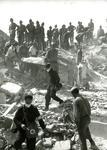Photograph of Red Cross workers looking for survivors following Skopje earthquake
Production date
1963
Audio tour
See full details
Details
Description
This black-and-white press photo, dated the 26th July 1963, captures several dozen troops and rescue workers, sifting through the rubble of a collapsed home, in the Macedonian capital of Skopje, after an earthquake devastated the city shortly before dawn.
At 5.17 am, a tremor measuring 6.9 on the Richter scale surprised Skopje as its people slept. It lasted all of 17 seconds, but in that short time, it managed to level 80% of the buildings, claiming the lives of 1,000 people, and leaving 200,000 people homeless. “A pall of dust hangs over the ruins of Skopje,” wrote Dennison Rusinow, 10 days after his arrival from the Institute of Current World Affairs in New York City. “When the wind blew,” he said, “windows and chunks of masonry would come tumbling down from the abandoned buildings of the city, and the dust rose chokingly again, smelling of death where death still lay undiscovered.”
But Rusinow was not the last to enter Skopje, and international response to the disaster was instantly unanimous: at least 78 countries offered their support. The Red Cross, from East Germany and Sweden, to Norway and Britain, donated thousands of woollen blankets and rescue workers, set up housekeeping at the newly-erected tent cities (some of which supplied by Kennedy's government from across the Atlantic) and established medical centres, such as the polyclinics donated by Romania.
Less than one year before the Skopje earthquake, the world had been on the brink of a nuclear conflict. Nine months hence, and Soviet and Western troops are working side-by-side in efforts to dig their fellow man out from under the ruins of a city. This display of camaraderie nicknamed Skopje 'The City of International Solidarity'.
In the photograph, a dozen or so Yugoslavian soldiers stand above the debris, gazing on at a stretcher making its way down the slope. Among those carrying the body, a white-shirted man who bears the look of a relative. Leading the procession is a Yugoslavian soldier, following carefully the path taken by a worker of the Red Cross, who, in turn, treads closely behind his colleague, the organisation's emblem on his satchel. They walk past another soldier at the base of the rubble, looking mournfully at the ground, defeated, perhaps, in spirit.
But the spirit of this moment, flowing gently downhill, endures in this photograph. Its composite parts all add up to a defining moment in world history: when the entrenchment of global politics, then at breaking-point, dissolved over a city in the Balkans and brought a world at loggerheads together—for a short time.
Audio recording by Daryll Hewitt (Volunteer), Birmingham.
At 5.17 am, a tremor measuring 6.9 on the Richter scale surprised Skopje as its people slept. It lasted all of 17 seconds, but in that short time, it managed to level 80% of the buildings, claiming the lives of 1,000 people, and leaving 200,000 people homeless. “A pall of dust hangs over the ruins of Skopje,” wrote Dennison Rusinow, 10 days after his arrival from the Institute of Current World Affairs in New York City. “When the wind blew,” he said, “windows and chunks of masonry would come tumbling down from the abandoned buildings of the city, and the dust rose chokingly again, smelling of death where death still lay undiscovered.”
But Rusinow was not the last to enter Skopje, and international response to the disaster was instantly unanimous: at least 78 countries offered their support. The Red Cross, from East Germany and Sweden, to Norway and Britain, donated thousands of woollen blankets and rescue workers, set up housekeeping at the newly-erected tent cities (some of which supplied by Kennedy's government from across the Atlantic) and established medical centres, such as the polyclinics donated by Romania.
Less than one year before the Skopje earthquake, the world had been on the brink of a nuclear conflict. Nine months hence, and Soviet and Western troops are working side-by-side in efforts to dig their fellow man out from under the ruins of a city. This display of camaraderie nicknamed Skopje 'The City of International Solidarity'.
In the photograph, a dozen or so Yugoslavian soldiers stand above the debris, gazing on at a stretcher making its way down the slope. Among those carrying the body, a white-shirted man who bears the look of a relative. Leading the procession is a Yugoslavian soldier, following carefully the path taken by a worker of the Red Cross, who, in turn, treads closely behind his colleague, the organisation's emblem on his satchel. They walk past another soldier at the base of the rubble, looking mournfully at the ground, defeated, perhaps, in spirit.
But the spirit of this moment, flowing gently downhill, endures in this photograph. Its composite parts all add up to a defining moment in world history: when the entrenchment of global politics, then at breaking-point, dissolved over a city in the Balkans and brought a world at loggerheads together—for a short time.
Audio recording by Daryll Hewitt (Volunteer), Birmingham.
Collection Type
Archives
Level of Current Record
item
Catalogue Number
RCC/5/10/53/IN3684
Subject auto tags
Object Types
Part of 1 highlight set
Share
All images are the property of the British Red Cross Museum and Archives (unless otherwise indicated), and cannot be used without permission. For queries about permission to use images, please contact enquiry@redcross.org.uk.


-1%20(002).jpg)